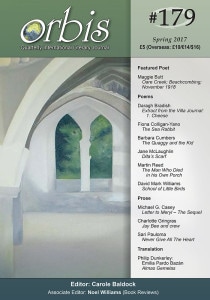|
Noel Williams, poet and co-editor of Antiphon, wrote this lovely review of The Density of Salt, and it was recently published in Orbis, Issue 179. I am reposting it here with permission, but please also visit the Orbis website and buy a copy of the magazine, if you can/are so inclined.
* CLOAKED IN THE FEATHERS OF A SWAN: REVIEW BY NOEL WILLIAMS The Density of Salt by Kate Garrett, 34pp, £6, Indigo Dreams Publishing, 24 Forest Houses, Halwill, Beaworthy, EX21 5UU www.indigodreams.co.uk Most of these poems present a third person persona which seems like first person in disguise, as if they’re obliquely confessional. They explore identity, relationship, the persona’s place in the world: somebody who feels she doesn’t quite fit. Or rather, feels as if she has a foot in two different places: not quite at home in either, yet continually drawn to the other, away from the unsatisfactory here-and-now. Kate Garrett often represents these tensions as the interpenetration of real and magical worlds. Her voice is sharply contemporary and unafraid, but drawing much of the imagery from myth and folktale, revitalising old motifs through personal relevance. In ‘A Selkie Seeks Truth on Fascination Street’, for example, the persona swaps one identity for another, trying, but not quite succeeding, to fit in. Struggling with a dual identity, her true self breaks through. In ‘Maybe Medea’, she explores a personality which can release a hidden destructiveness: ‘My dark goddess understands: … / I need their lives. I feed on salvation / and destruction alike’. In ‘The Tooth Fairy’, the ambivalence of motherhood is exposed. She expresses an absolute desire to protect her son yet must accept the inevitable erosion of trust. Her lie will eventually be revealed: that she is the hidden agent of fairyland, when his growth towards independence enables him to ‘learn the truth / about magic.’ Similarly, many pieces examine transitions from security, simplicity or certainty, to disruption or loss. In ‘JFK to Heathrow’, for example, ‘I leave behind the twinkle / of a city holding on to people who talk like me’. This loss of a sense of belonging aligns with a yearning for lost places of magical innocence, places which inevitably vanish when confronting a world of real breakups, conflicts, human failings and desires. In the quotidian world, ‘we turn / gold back again into straw’ (‘If Wishes Were Horses’), though that golden innocence may itself be no more than a ‘bitterdust magic’. Like the swan maiden, she may weep for a lost, half-perceived world, as ‘The Girl Wanders’: the shifting border between waves, clouds and sand where she searches for lost things. Such poems may begin in the poet’s personal analysis, but relate to all of us in echoes of innocence, as we try to rediscover lost worlds through our inadequate words.
2 Comments
On October 30, 1985,
Reply
Leave a Reply. |

 RSS Feed
RSS Feed
